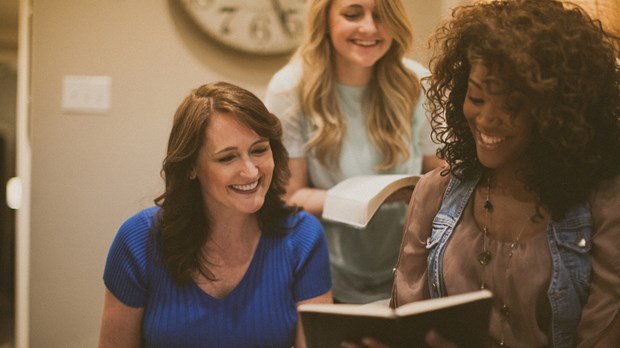When Your Bible Study Becomes Group Therapy

Somewhere in that narrow window between dinner on the table and total, tired meltdown, my friends and I shuffle our kids downstairs with the babysitter, grab a cup of coffee, and circle up. Like a halftime huddle, this midweek ritual shores us up for the gridiron of life.
Then several months ago, something felt off about our treasured time together. Our Bible study began to feel more like group therapy. Looking back, I can see that, as the leader, I’d made a critical mistake: I’d taken the Bible out of the Bible study.
Mind if I invite you in to our circle so you can see how it happened?
Meet the Ladies
Of the nine women in our study, five have full-time jobs outside the home. Three have full-time, work-from-home jobs. One homeschools her three children.
We are the proud mamas of 24 kids under age 11. Yes, 24. The football analogy I used earlier is legit. We can field two complete teams and supply a couple benchwarmers.
Our Bible knowledge varies wildly. Some of us can debate the finer points of propitiation. Some of us struggle to find Leviticus without using the table of contents. Some have read the Bible since childhood. Others purchased their first Bible in their thirties.
If you are a woman trying to know and follow Jesus while keeping a thousand plates spinning, pull up a chair. You’ll fit in just fine! But you should know, there’s homework.
Did I lose you? I was afraid of that.
Because I wanted us to open our Bibles more than once a week, I chose a Bible study curriculum with required homework. That presented a problem, namely that no one would do it. As a former teacher, I know how to lay on the homework guilt, but these are my friends, and I know how hard we’re all trying. The women in my Bible study are amazing wives and mamas, productive workers, and faithful volunteers. I don’t want to add to their burden; I want to ease it.
So I lowered the bar. I tried teaching with the assumption no one would do their homework. But leading a discussion about a passage no one had read was gawky at best—lots of awkward silence and very little eye contact.
Dropping homework felt like an easy call at the time, but I overlooked this essential facet of teaching: Whoever is doing the work is doing the learning.
In addition to scrapping all homework, I also always picked topics I knew the women in my group loved to discuss, primarily marriage and motherhood. Except mostly we talked about how we aren’t being good wives and mothers. We fessed up to our failures, cried a few tears, encouraged each other, prayed, and dismissed.
On some weeks we never even opened God’s Word. We’d leave our “study” resolved to pray for our husbands more, yell at our kids less, oh and . . . read our Bibles at some point in the week. In this way, our group was not much different from a 12-step meeting or counseling session.
Let me be clear: We didn’t go wrong by talking about our lives, encouraging each other, and crying into our decaf together. That’s good stuff, but that’s just the icing on the cake. The most important thing we can do together is feast on the Word of God. As the leader, I’d made the mistake of essentially omitting the Bible. I have a hunch it’s a pattern not limited to my little group.
We cannot become better Christ-followers by being better wives and mothers. Instead, due to the transformative work of Christ in us, we can become better wives and mothers by becoming better Christ-followers.
As leaders of women, we need to stare this truth in the face: There’s a difference between wanting to be better disciples and just wanting to be better women. Discovering that difference will transform how we study the Bible together.
Find the Me, We, He Rhythm
I found that Jesus’ Sermon on the Mount is a great resource not only for teachings about discipleship but also as a pattern for the way we each teach and learn from Scripture. I call it a Me, We, He rhythm.
Me. Jesus started his sermon with the Beatitudes, a series of lessons about how we should think, feel, and live. There must be room in our Bible studies for self-reflection. As we lead women, let’s give them freedom to talk about themselves.
We. After the Beatitudes, Jesus addressed what we all should be as Christ-followers, calling us “salt and light” (Matthew 5:13–16). There is some sense of personal responsibility to represent Christ well here, but the emphasis is on solidarity. We, the church, are the salt of the world and a city on a hill. Knowing we’re all in this together, how can we represent Christ well? What might change if we started asking that question each week at Bible study?
He. From salt and light, Jesus pivoted to deep spiritual truths about himself (Matthew 5:17–20). We need to know that the Bible is not primarily a book about us; it is primarily a book about Jesus. When we come to Bible study week after week hoping to learn a spiritual truth for how to be better women, we miss the fact that Jesus’ name is the one on the marquee. We should always drive toward discussion of Jesus himself.
In this single sermon, Jesus repeats the Me, We, He cycle twice more, landing the plane on “He” by explaining that he is the solid rock upon which we can build our lives.
Transform Your Study
I’ve learned three simple steps to keeping our studies Bible-focused. These ideas got my Bible study group back on track, and I hope they’ll work for you too.
1. Raise expectations. When Jesus taught, he tackled the law, the church, and the coming judgment. He invited his listeners to wrestle with big ideas.
Following his lead will look different from group to group and week to week. It may be doing homework that’s part of the curriculum. It may simply be asking women to read, pray through, or journal about the passage ahead of time.
Remember that assignments are always given with heaping portions of grace. Communicate both that women should be studying the Bible on their own because it is a treasure trove and that women are welcome even when their week goes sideways and their Bible remained unopened.
2. Go to the source. Instead of filtering the Bible through what someone else says, dig into the Word itself. Remind women often to bring their Bibles and help them learn to navigate them. Communicate, “We’re wrestling through this big, beautiful book together.”
Our group began picking a passage and reading it aloud three to four times and then discussing the Me, We, He questions: What does this tell us about us? What should we do? What does this tell us about God?
3. Embrace rhythm. Using the Me, We, He pattern, your group studies will have a rhythm of teaching and learning. Make the Bible the center of your time together but also leave margin to attend to the needs of group members. Ask the Lord to help you prioritize his Word and to help you minister to the women in your circle.
It’s a sad irony that women who over-focus on study miss the opportunity to pause and minister to a sister who needs compassion. Flip that coin over and we see a corresponding irony: women who offer compassion to a sister absent of God’s Word.
Call a few friends, brew a pot of coffee, and crack open the living and active Word of God. The Bible is a deep well. Women who drop a bucket there will pull up answers every time.
Erin Davis is a blogger, speaker, and writer of several books, including her most recent, Connected: Curing the Pandemic of Everyone Feeling Alone Together. She chases chickens and children on her small farm in the Midwest.
Copyright © 2016 by the author and Today’s Christian Woman
Read more articles that highlight writing by Christian women at ChristianityToday.com/Women
 Read These Next
Read These Next

 The List That’s Still Saving Thousands of MarriagesWhat continues to draw so many readers to the story of a broken marriage, a paper, and a pen?
The List That’s Still Saving Thousands of MarriagesWhat continues to draw so many readers to the story of a broken marriage, a paper, and a pen? How Excellent Is Thy NameWhat God invites us to call him says volumes about his relationship to us.
How Excellent Is Thy NameWhat God invites us to call him says volumes about his relationship to us.
 How to Effectively Witness6 principles for personal evangelism
How to Effectively Witness6 principles for personal evangelism








 Homepage
Homepage